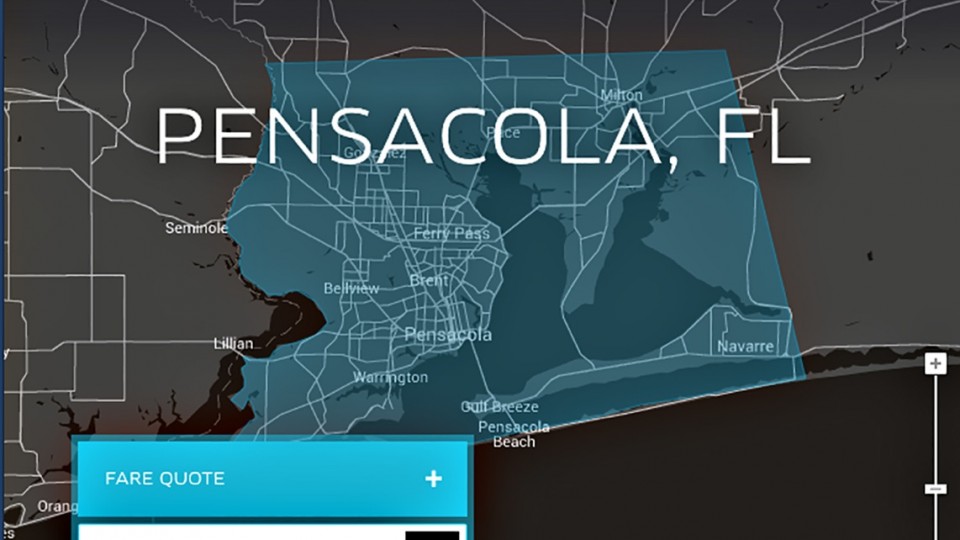Kansas City could be Pensacola's Uber guide
- July 15, 2015
- / Shannon Nickinson
- / community-dashboard

Mayor Ashton Hayward wants to look to Kansas City, Mo., as an exemplar for making ride-sharing service Uber more a part of Pensacola.

Pensacola Mayor Ashton Hayward and David Plouffe, senior vice president of policy and strategy for Uber. Photo credit: Instagram
Hayward, who attended the U.S. Conference of Mayors in San Francisco, toured Uber’s headquarters. He says he was impressed with the way the growth of Uber nationally shows use the pervasive use of technology is pushing cultural and business changes.
“I Uberpooled from the airport in San Francisco into the city,” he said. “While that doesn’t necessarily scale to Pensacola, for example, one of the things they talked about was in other cities, kids under 30, if they’re going to drink, they’re going to Uber.”
Tamara Fountain, the city chief operating officer, said that she found the example of how Kansas City, Mo., rolled out Uber to be helpful in looking at ideas about ways to integrate the ride-sharing service in Pensacola.
“You hear other mayors talk about how they brought Uber into their town,” Fountain said. “There are questions to answers about how you keep people safe. I want to look at how Kansas city introduced their Uber ordinance. They did a great job of putting mechanisms in there to make sure that citizen safety is addressed but also to make sure that we can go ahead deal with what is obviously consumer-driven demand.
“People want Uber,” Fountain said.
In April, the Kansas City Business Journal reported that the city struck a deal with the ride-sharing company that would allow Uber to keep operating in the city.
As part of the changes passed Thursday, Uber would have the option of paying an annual fee of $45,000 and drivers would pay no fee. The ordinance included a $40,000 annual fee for ride-hailing companies and a $100 fee for drivers.
Another change allows transportation companies or drivers to provide background checks to the city. Those checks still must meet the city's public safety requirements.
Jim Ready, manager of the city's Regulated Industries Division, said the changes will go into effect immediately. He said the ordinance also will call for a full review of the policy six months after the ordinance is passed.
San Francisco-based Uber, which uses a smartphone app to link private drivers with riders, has swept into more than two dozen Florida cities.
The company’s Uber-X service launched in the Pensacola area at the end of 2014. Last week, traditional taxicab drivers protested Uber-X’s entry into the market.
City of Pensacola officials said that Uber is regulated by City Code, Section 7-10.
City taxi rules
— The taxi company must be approved before they may be permitted. To be approved for a taxi license in the city limits, you must submit a financial statement, experience in transporting passengers, proof of taxi insurance, office location and business hours, have a light underneath the car that emits a red glow and a fact sheet of why the city needs the business.
— Each vehicle must have an annual inspection completed by the Pensacola Police Department or by Pensacola International Airport (if they will be picking up at the airport).
— All vehicles should have commercial-for-hire insurance policy with the minimum amount of $300,000.
— Would-be applicants also must register with www.sunbiz.org before getting a business license and obtain a county business tax receipt from county Tax Collector Janet Holley’s office.
— Taxi fees include a $250 airport permit; a $41.25 city permit; and a $50 business license.
City’s code states: “No vehicle which has been rented or otherwise made available for hire with a driver shall be operated in the city unless a vehicle permit has been granted for such vehicle by the city.”
Further, the code states that all vehicles for hire must be issued a license number, must have identification marks on its vehicles, pay applicable fees and submit to background checks.
The state is conducting a $10,000 study by the Legislature’s Office of Program Policy Analysis and Government Accountability would look at the impact app-based ride-share services have on reducing drunken driving in Florida. That study will wrap up in April 2016.
During this spring’s regular legislative session, a proposal for statewide regulations that would have overridden local rules for the fast-growing transportation networks died.
So did a push for new insurance requirements for the ride-sharing companies.
 CivicCon launches with a look at good growth in cities
CivicCon launches with a look at good growth in cities
 Building stronger brains one baby, one parent at a time
Building stronger brains one baby, one parent at a time
 SCI debuts commercial on Early Learning City
SCI debuts commercial on Early Learning City
 Entrecon: World class speakers and an opportunity to sharpen skills
Entrecon: World class speakers and an opportunity to sharpen skills
 PYP Quality of Life survey 2017
PYP Quality of Life survey 2017
 EntreCon Pensacola 2016: A look back
EntreCon Pensacola 2016: A look back
 Leadership tip: getting better employee takeaways
Leadership tip: getting better employee takeaways
 Leadership tip: be interested instead of interesting
Leadership tip: be interested instead of interesting
 Leadership tip: delivering difficult messages
Leadership tip: delivering difficult messages
 Brain Bags boost Arc, Early Childhood Court programs
Brain Bags boost Arc, Early Childhood Court programs